Ways In Which The Movie 'Cloud Atlas' Has Changed My Life
by Liam Callanan
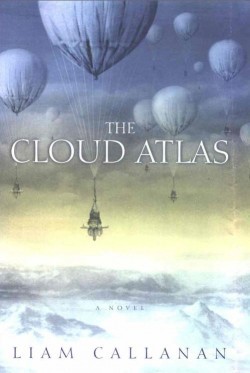
1. My website, cloudatlas.com, was hacked by Russians and blacklisted by Google.
2. My novel, The Cloud Atlas, zoomed to a triple-digit Amazon ranking without my having to email — as I did back when my novel was first published — a single parent, aunt, cousin, neighbor, classmate, ex-girlfriend, former teacher or current student and beg them to buy the book instead of “waiting until the library gets a copy,” as a friend promised he would.
3. Instead, I get a lot of email, from loads more readers than I used to.
4. Including one at 12:14 a.m. this week from someone who had accidentally checked my book out of the library, and was still reading it.
5. Many people write to say that they liked my novel better, and not just because I tacked a definite article on the front of the title.
6. Other people write to say they like Cloud Atlas better, which kills me because I knew I should have cut that The, but it looked so pretty.
7. A lot of people are posting Amazon reviews for the wrong book, except for the elderly guy who, a long time ago, gave my book one star — because, he wrote me, #1 means best and your book is, and which has tanked my ratings ever since.
8. Other people write to ask why the book doesn’t match the movie.
9. I find myself having to explain that even though I, unlike David Mitchell, never considered my novel “unfilmable,” no one ever bought the rights to my novel, although there was an exciting phone call with a Hollywood agent who said he loved the book but — Listen Liam, snow is expensive. It would help you to know, I suppose, that my book is set in Bethel, Alaska. It would also help, if you were trying to acquire film rights for my book to have read the book, wherein you’d discover that there’s no snow in it, because it takes place in Alaska in the summer. But Liam, it’s Alaska, so people are going to think snow, want snow, and snow isn’t cheap, you’ve gotta shred diapers and usually in London.
10. I find myself musing about how I not only had the title first (by a few months, at least in the US, and no, you can’t copyright titles but another thing I was totally in on before everyone else — at least before Taco Bell discovered it — was Bethel, Alaska, where I was interviewed by the bilingual English-Yupik public radio station that gave Corey Flinthoff his start.
11. I remember that I ate at another chain in Bethel, Subway, as a guest of the town librarian, who had graduated from library science school about five minutes earlier, and when I asked her who was paying for these overpriced, but-that’s-a-long-way-for-Jared-to-ship-the-shredded-lettuce, $10 foot-long turkeys on wheat, her or the library, she said, “I am the library.”
12. I remember walking out of her library with fistfuls of cash, because that’s where we did the reading and sold books for $20 even, cash on the barrel, and I think there was a barrel, and I was happy to sell out because I’d had to bring them in my luggage all the way from Washington, DC.
13. I recall how, as little as a few weeks ago, my novel, written after [insert standard debut novelist years-of-toil story here, though mine includes a bad-luck lava rock repatriated to Hawaii with a $20 bill and this guy’s help, which totally works, people, see 1–24], sold, gently used, for a single penny on Amazon, less than you’d pay for a stale gumball from the Lion’s Club at the supermarket, and now costs $11.15 used (paper) or $162.09 “new” (hardcover, and sold by the aptly-named Amazon bookseller, “yourdollarstretcher” in Connecticut) — or $10.20 (paperback and truly new) from Random House (via Amazon), which is the only way I make royalties, which is a bummer, because Amazon’s estimated shipdate now fluctuates from days to weeks to months, by which time people will have moved on, unless they’re watching the movie, which I understand takes a while.
14. I spend a very short amount of time each day wondering how much David Mitchell got for the film rights and wonder if I’d use the money to put my kids through college or to put them to work at the bookstore in Paris they wanted me to buy.
15. I remind myself that no one’s really in this for the money, not even the Russian hackers.
16. I think about how no one offered to buy cloudatlas.com, not even the Russian hackers.
17. I wonder if Alexander McAdie, like me, selling a ton of books by mistake right now. (Or Donald Platt.)
18. I return to Tobias Wolff for solace, who said he was warned he might want to change the title of his book, Old School, back in 2003, because a man named Will Ferrell was bringing out a movie of the same name, and it was very different kind of school story in that Wolff doesn’t directly address jello wrestling, but Wolff’s editor Gary Fisketjon said no, don’t change it, because, Wolff reported, “there would be very little overlap between the audiences for the book and the movie.” And Wolff told me: “in my case, at least, he was wrong — I’ve seen it twice.”
19. I’ve seen it once.
20. Otherwise, I spend my time making lists of things.
21. That might have been.
22. And then I go buy a ticket to the movie already.
23. And maybe his book.
24. And maybe, if I can scratch up the dough, a copy of mine for him.
Liam Callanan is also the author of All Saints, a novel that, thanks to similar confusion, was celebrated worldwide on Thursday. (And if you don’t want to wait for Amazon, you can always try his hometown indie bookseller, Boswell Books, to whom he writes a mash note in the new anthology My Bookstore.)
Obamacane: Is NBC's Sandy Benefit Really an Obama Commercial?
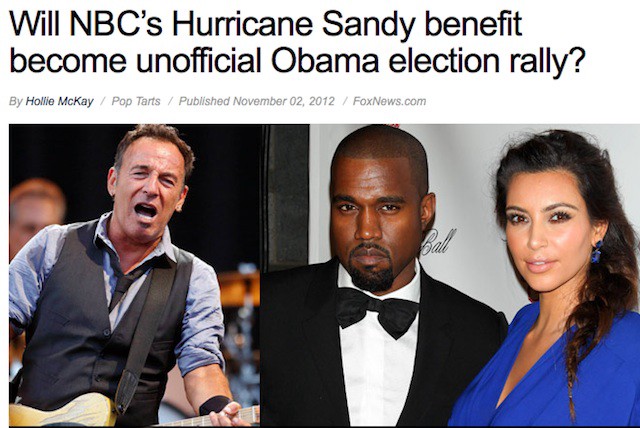
In just a few hours, most every functioning television screen on the Eastern Seaboard will be showing NBC’s new mid-season replacement reality series, Hurricane Sandy: Coming Together. And we aren’t the only ones who smell an entire river of dead rats. Fox News, for example, has an interesting take that is mostly “interesting” for its picture of Kanye at the top of the story. (Kanye West isn’t scheduled to do the benefit tonight, but he did say something about George W. Bush at another hurricane benefit, seven years ago. And Kanye is also black … much like Obama.)
But with the Presidential election just days away, and the notion that a number of those in the lineup are outspoken Democrats — such as Springsteen, who recently endorsed Obama, and is scheduled to play at his final rally Monday night; Fallon, who has interviewed Obama on his late night show; and Billy Joel, who joined Springsteen to proudly endorse Obama in 2008,some critics have expressed concern that the telethon will become a politically-driven Obama rally.
Is that a white woman with Kanye West? And who is that angry old liberal yelling in the picture, Howard Dean or somesuch? Let’s say “Howard Dean.” He is hosting tonight’s Obama Benefit.
Because our sister blog Idolator got washed away by the Frankenstorm, we will be unable to liveblog tonight’s benefit concert, which will be broadcast at 8 p.m. Eastern time. But maybe you can liveblog it, or type comments? Or not? You might just want to figure out how to get home in the dark, on all these weird streets that are apparently over the subway tunnels.
New York City, November 1, 2012

★★ After another brief sunny morning, the lid of clouds clapped down again, leaving a cold, top-to-bottom winter gray. A toddler crossing the street coughed, and the baby in the stroller coughed back. Dogs were out everywhere, and dog-walkers. The entrance to the Park was choked off with fences and generator trailers and tents for the marathon. Against the downtown sky, at 57th Street, the broken crane still dangled. Inside the Park, a man wearing safety green stood in a cherry-picker basket, up among the trees, and pointed at a higher limb in need of closer inspection. Rounding the corner away from the park, the sound of a chainsaw faded into the sound of a jackhammer. A Callery pear tree showed a wound where one of its limbs had been torn away. The next tree had lost its entire top. Farther west, a leaf fell all on its own, straight down, unforced. Another followed it.
New York City Subway Lines, In Order, That We Miss Terribly
by Vijith Assar

25. C
24. S (Franklin Avenue Shuttle)
23. R
22. G
21. A
20. 7
19. 1
18. J
17. Z
16. S (42nd Street Shuttle)
15. 3
14. S (Broad Channel)
13. D
12. E
11. M
10. F
9. SIR
8. B
7. 6
6. 5
5. 2
4. L
3. N
2. 4
1. Q
Vijith Assar compiled this list while riding one of those free buses over the Manhattan Bridge and wants all the trains to know that he loves and misses them. Photo by the MTA.
Man Expresses Distaste For Literary Fiction
It is close to the end of what has been a rather trying week. Why don’t we run out the clock by debating the worth of genre fiction? I mean, if that’s not what you’ve spent the whole week doing already.
Have We Reached Peak "Gimme Shelter"?
Will movie directors kill the impact of “Gimme Shelter” through overuse? Sure, why the hell not.
8 Ideas That Will Fix Everything (Sandy, Etc.)
Did you get your Hurricane Sandy mementos yet? A whimsical “I survived Hurricane Sandy” mousepad is one of many excellent ideas floating around, post-storm, and we have gathered a few others you might want to implement immediately:
- Marathon contestants are welcome, but during the run they must wear BabyBjörns filled with supplies to be delivered door-to-door along the route.
- Outlawed giant soda cups can be used to scoop dead baby rats from your drinking water.
- Paul Ryan, who seems like he needs something to do this weekend, can bench press old people back and forth to their apartments.
- Time for zombie cosplay! Get 10,000 of your friends to fill a tunnel, like in The Stand or something. Halloween is rescheduled!
- Somebody on the radio said a lot of leafy produce would “go to landfills.” Do one of those pop-up salad restaurants, at a landfill. Help the Staten Island economy!
- Make a video of yourself telling jokes in an empty room and send it to Hollywood talent scouts, with the claim that you were “a guest on Letterman during the hurricane.”
- Use this crisis-generated moment of community friendliness to start a walking club. Hey, you have to walk for miles and miles anyway. Might as well call it a club.
- Try to get a flight and then try to get to the airport, so you can go somewhere else for a while. You could also walk to California, with this guy.
Science Discovers Why People Hate Nate Silver
“The anticipation of doing math problems lights up pain networks in the brain for people with high levels of math anxiety, according to a new study.”
The Meme Election: Clicktivism, The Buzzfeed Effect And Corporate Meme-Jacking
The Meme Election: Clicktivism, The Buzzfeed Effect And Corporate Meme-Jacking
by Whitney Phillips and Kate Miltner
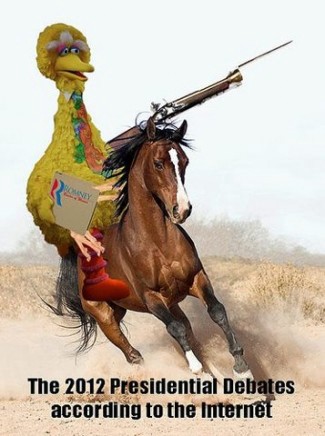
One of the main memes from the 2012 Presidential election has been… memes about the 2012 presidential election. Here to talk about it are academic internet experts Whitney Phillips and Kate Miltner. (Whitney recently completed her PhD dissertation on trolls; Kate wrote her Masters thesis on LOLCats — yep!) Up for discussion today: GIFs, meme river, and what it all means now that political memes have gone pop.
Whitney Phillips: So memes, right!? Memes are so hot right now. MEMES. Whatever that term even means anymore! We are wading through puddles of memes, whether we’re talking about unimpressed gymnasts, television premieres, or NASA scientists. Memes have even broken into the political space — if there is anything more pervasive than political memes, it’s the discussion and collation of political memes. It’s now routine for news organizations like Time and ABC News to file helpful reports like “Binders Full Of Women: Ladies And Gentlemen, Your New Political Meme” and hurl around listicles of the “funniest debate memes” like so many politically-themed frisbees.
And people cannot seem to agree whether this is a good thing or the worst thing! For some, political memes represent an EPIC WIN for CROWDSOURCED DEMOCRACY. For others, they are a sign of the intellectual apocalypse! For many seasoned internet hands, they provide further proof that memes have become the victim of their own success. So which is it? Are political memes ushering in a new era of crowdsourced democracy, or are they proof that the American political discourse has become so superficial that we can’t digest anything longer than 140 characters?
Kate Miltner: The only winning move is not to play that game, Professor Doctor Falken Phillips. I know that Crowdsourced Democracy vs. Hurr Durr ‘Murrica makes a neat binary categorization, but I think whether the memeification of the election is a good or a bad thing is not exactly the point: this is just The Way We Election Now, and that comes with a whole host of implications.
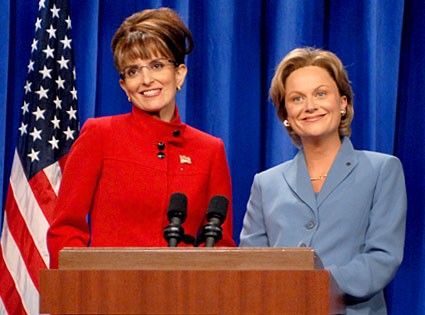
The political memesplosion is not exactly a surprise; this is just an evolution of behavior that’s been happening elsewhere, in pop culture, for a while. It’s not like the 2008 election was/a> without its memes, but two shifts have happened since then. One: memes (and meme creation as a cultural practice) have become mainstream. As you’re well aware, this process has been happening for a while, but I think the Olympics marked a turning point in the sense that memes and joke Twitter handles became an automatic (and expected) reaction to news events for people who were not part of the meme subculture before (we saw it with Hurricane Sandy too). Secondly, as you pointed out, memes are now part of the news cycle. Part of political news cycles (at least, in the past few years) has been coverage of pop cultural digestion of/reaction to political figures and events. In the last election we had “SNL” clips; now we have the Tumblr GIF squad; and instead of playing Tina Fey’s Sarah Palin impression on repeat, network news talking heads are yammering on about Big Bird Holding A Binder Full Of Women On A Horse Wielding a Bayonet. If Joe the Plumber had happened in 2012, he’d have been an exploitable/image macro from Day 1, with attendant “OMG NEW MEME REPORT REPORT OMG” from the Huffington Post.
While not all memes coming out of this election are representative of democracy unbound, they aren’t heralding the end of Pure, Reasoned Political Discourse either. I think the concern of those who think that we’re “throwing cupcakes into the crowd” is that memes will simply replace more in-depth debate/discourse, which I haven’t observed is the case — I’d say they’re supplementing (and in some cases, sparking) it. I feel like any time a marked change in online behavior comes along, people get all black-and-white and hand-wringy about it. Exhibit A: OMG Facebook is going to replace REAL-LIFE INTERACTION and we’re all going to end up incapable of speaking to each other without screens.
Whitney: CARBON TAX! Also I agree that playing the game (i.e. DEMOCRACY vs. DUMBOCRACY) risks losing the game (in the sense that it sidetracks people from asking what people are actually doing and why these things might be so appealing), and absolutely agree that this is just How We Election Now. But I do think it’s worth considering why memes have become such a divisive issue.
There’s always been the highbrow/lowbrow divide; people have been weeping over how stupid everyone else is and how much worse everything is getting since humans learned how to whine about the good old days (back in my day being a Neanderthal really meant something; now it’s just a pickup line). So those concerns are expected, almost trite. But the political purists, who apparently only ever have Deep Important Thoughts, aren’t the only people in the facepalm camp. A large swath of early meme/ROFL/internet culture whatever-adopters (a category that has existed for years, but still doesn’t have an agreed-upon name) have long been wary of the mainstreaming of internet culture, and see the onslaught of poppy political memes as further proof that meme/ROFL/internet whatever culture has gone corporate. Think punks walking past a Hot Topic store.
From the ROFLers’ perspectives, the kinds of memes that have emerged from the debates and are coming from the election generally — a large percentage of which have been created by paid editorial staff — qualify as so-called “forced” memes. That is, they are popularized not through a community-vetted, collectively-constitutive process, but because some person who has already been paid or hopes to be paid (i.e. bloggers and/or marketing people) have manufactured whatever content to meet the demands of his or her job and with no regard for (what are regarded as) ALL INTERNET TRADITIONS and/or for the traditions of that particular community. Taxation without representation, if you will, except instead of levying taxes, the creators and amplifiers of “forced” content impose their fully-formed memes onto a community without allowing that community to seed and spread their own content. I have taken to calling the more egregious of these wannabe-memes “poochies,” after the lame “cool” character brought onto “The Itchy & Scratchy Show” (shades of Scrappy-Doo for 70s kids). Like Poochie, those forced “cool” memes are failed attempts to capitalize on spaces and behaviors because marketers fundamentally misunderstand them.
Kate: POOCHIE! Poochie definitely needs to happen. While I don’t disagree that forced memes can be incredibly annoying/completely miss the point and give those with knowledge of/attachment to All The Traditions a case of Cankleshausen Syndrome, I can’t help but feel that this is a little too Frankfurt School for my taste (i.e., the only art is High Art and that pop culture is going to destroy us all because we the General Public are a bunch of brainless zombies who do whatever the puppetmaster advertisers tell us to). The fact that a distinction is developing between high-meme culture/low-meme culture is pretty hilarious, simply because most people consider memes to be the lowest of low culture — and anyone who tries to persuade people otherwise usually gets mocked outside of internetty circles. Or at least, that was my experience with my LOLCats thesis — most of the comments on the mainstream news sites that covered it were hilariously outraged that me and my waste-of-time degree even existed.
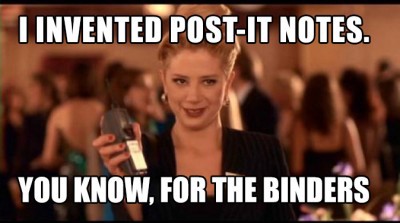
Anyway, the whole SOME MEMES ARE GOOD BECAUSE THEY ARE REAL AND SOME ARE JUST COPIES just seems like of the modern-day equivalent of Adorno and Horkheimer being all, “Classical music and Renaissance paintings are TRUE art and jazz and movies are CRAP for MORONS,” which, LOL. Also, extra lol, since these “fake” election memes are probably going to be the thing that end up giving memes legitimacy in mainstream circles, because they deal with “real” issues as opposed to a subculture that can be difficult for others to comprehend. People understand why Horses and Bayonets could be “important” — it’s humorous commentary on a political statement. People are familiar with satire. Compare that to something like Dolan and Gooby — it’s not a surprise that people would be like, “Uh, what is this? This is supposed to have societal significance?”
Whitney: Yes, I’m immediately suspicious of any argument that hinges on an apparently clear-cut and self-evident and natural and necessary distinction between that which is “real” or “authentic” and that which is “poo poo” — whatever nouns you use to fill in those blanks. In the case of memes, even poochies, there’s always some negotiation between the people who make whatever thing and the people who engage with whatever thing. (I’m deliberately avoiding using the term “consume,” which implies we’re all just passive brand-receptacles into which the latest poochie can be slopped).
Kate: Right, and that has been the case for ages — even some of the earliest audience research demonstrated that the way people interpret media texts is far from universal and has to do with a whole lot of things — class, education, personal taste, social group, and so on. Beyond interpretation (active vs. passive audiences, woooo!), there is a long history of people taking content created and distributed by The Man (movies, TV shows) and turning it into something of their own making (Star Wars! X-Files! Harry Potter! Pretty Much Anything by Joss Whedon!). You can see this even within meme culture — a couple key examples being The Most Interesting Man In The World and the One Does Not Simply memes.
Whitney: YES. People do things with things, for all kinds of wacky reasons. At the same time, we do need to think about the economic underpinnings of these interactions, particularly when the economics are, or at least appear to be, invisible. Memes are a prime example, since although they might seem to transcend capitalist concerns (they are free! anyone can make or share them! just add your caption here!), they most certainly do not. Consider the Buzzfeed effect, a term I just made up: in the wake of major cultural events, for example the Presidential debates, you have a nest of insanely influential organizations acting as ex post facto gatekeepers who have the power to make a meme by saying that something IS a meme — a process central to any smart ad-revenue-based business plan. Memes are, in other words, a commodity; there is a great deal of financial incentive to keep the meme-boat chugging. I direct you to the you’ve-got-to-be-trolling concept of “memejacking,” or as I call them, “backdoor poochies.” Essentially, memejacking is the process by which marketers attempt to tack brand identity onto an existing meme, like some sort of unholy game of pin-the-tail-on-the-donkey. The 2012 meme-scape, everybody!
Kate: To wit:
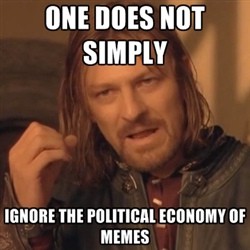
Whitney: Indeed. Take horsemanning, for example, which was a riff on the “positioning your body at an odd angle and then taking a picture and then uploading it to the internet, for some reason” meme of 2011. BuzzFeed created horsemanning the same day they declared it the HOTTEST NEW TREND ON THE INTERNET, which ruffled
a few feathers. Because whether it’s BuzzFeed braying about this thing they literally just made up or marketers running around with corporate logo staple guns, it’s all just inauthentic cynical grossness, right?? Why yes, yes it is. BUT ALSO, it’s this precise junction of economic interests and user engagement that complicates the presumably clear-cut distinction between “authentic” memes and “fake” memes. Because even if [X] thing starts out as some made-up bullshit, it’s engagement — remixing, reblogging, retweeting, recontextualizing, re-whatevering — that ultimately makes the meme. Some people might be inclined to argue that any astroturfed or otherwise forced meme should be rejected on the premise that its origins are “inauthentic,” but on the internet, origins rarely matter. However these memes end up in meme river, whether through some grassroots community-vetting process or via astroturf, they do end up there, which means that, like it or not, we have to deal with them as such.
Kate: I definitely want to talk about meme river (❤ U, Henry Mancini) but first I want to get back to what you mentioned about the nest of influential organizations like Buzzfeed, Cheezburger, and Tumblr and their status as gatekeepers. You’re right that there’s more overt agenda setting that’s going on in terms of certain sites/groups saying “YOUR NEWEST MEME IS MITT ROMNEY RIDING A RAINBOW COLORED MANATEE AND GO.” But there’s a more subtle variety of agenda setting taking place as well — and here I’m talking more about GIFs than memes. Some people view GIFs simply as mini chunks of video, but there is a distinct art to making a GIF (as anyone who enjoys a What Shall We Call Me / reaction GIF Tumblr will tell you). I’m sure that Tumblr and their army of GIF artistes view their creative efforts more in the context of entertainment and zeitgeistiness than political influence. However, when you have the means of production as well as a heavily populated platform, you have the ability to shape the conversation. I think it’s fair to argue that GIFs are quickly becoming the new soundbites (or, at least, are becoming the visual equivalent of soundbites).
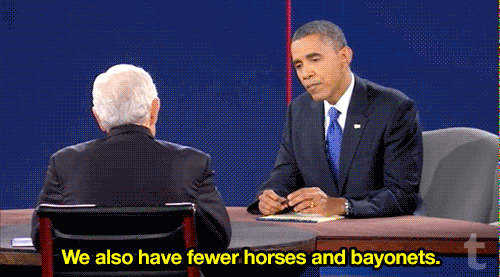
Specific moments are turned into GIFs, which then spread through the online ecosystem and end up representing/becoming emblematic of entire speeches/debates/events. In that context, how those specific moments are selected and framed (and who selected and framed them) becomes pretty important. Specifically, the political leanings of the GIF creators become a factor, because their personal preferences are “encoded” (intentionally or unintentionally) into the GIFs they’re making — for example, choosing moments that are more flattering to Biden than to Ryan, or cutting the frames in a way that makes Obama look imperious.
Whitney: All I can say is, the Obama Campaign owes Tumblr an Edible Arrangement. But it’s not just that the GIFkeepers’ leanings have political implications, they’re extremely predictable, for the precise reasons outlined above. The meme stream is in the end a revenue stream; the quicker a platform can jump on a comical phrase or moment or gaffe , the more traffic will be funneled their way. So these days the question is never “will there be memes” but “which memes will they be” — making the runup to any major news event a Mad Lib just waiting to happen.
Voila!

Kate: I used to get Mad Libs in my stocking every Christmas, they’re the best (except for when they dictate the information received by the electorate HAHA AMIRITE?). As far as the question of “if memes are here to stay, which memes will they be?” I want to bring us back to good ol’ audience agency again. Not all memes are created equal, and the difference between a major meme and a smaller meme ultimately comes down, as you pointed to before, to the level of engagement it sparks. There are definitely people/organizations who can, by virtue of their large followings, bring a meme into the spotlight. However, that meme will keep going only if people keep it alive through reblogging/remixing/retweeting, and they will only do that if the meme means something to them on some level. For example, Eastwooding vs. Binders Full Of Women. Eastwooding was pretty much a blip on the radar, and I think that’s because it was a WTF moment that didn’t really have larger significance for most of the populace (unless you live in the Californian desert, apparently). Binders Full of Women, however, gained (and has sustained) more traction because it connects to a deeper issue (gender inequality in the workplace) that was building momentum independently in the months (and years) leading up to the election. That particular meme struck a chord with people, and you could see that by its scale and the comparative longevity of its popularity.
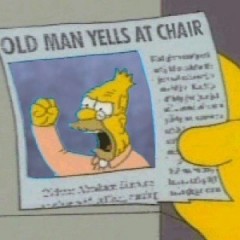
Whitney: Eastwooding was fun because it was so obvious. Within fifteen seconds everyone started making the same jokes, half of which were about Grandpa Simpson. For a folklore-inclined human like myself who also watches too much television, this was just the tops. Binders Full of Women required a bit more thought, so had a longer half-life and greater memetic variation. IT TAKES ALL KINDS, ON THE INTERNET.
Kate: I agree, and this (meaning memes like Binders Full Of Women and their ilk) is where I think memes can contribute to meaningful political discourse — they can act as springboards for deeper analysis and debate about important topics. Yes, I’m sure that there are a lot of people who have used BFoW to demonstrate that they Care About Women’s Issues (broseph), but there are also a lot of people — journalists as well as regular folks — who have used memes to get people talking about a significant issue that would be considered “boring” otherwise (Lily Ledbetter, what a SNOOZER). Latoya Peterson talked about this during the Lolitics panel at ROFLCon. She was discussing the Shit X Says To Y meme, and pointed out that it’s easier to bring about awareness of political issues through humor than it is by being preachy. Spoonful of sugar!
In a related vein, it’s important to consider that Twitter and memes might get people involved who wouldn’t necessarily be otherwise (disaffected youts, y’all!), simply because the memeification of politics has made it requisite cultural knowledge (“How will I be able to be cool on Facebook if I don’t understand what ‘ malarkey ‘ means”)? BLEAK HOUSE but seriously — a recent study from Sweden was showed that 13–17 year olds who were involved with user-generated content were more likely to be politically active (both online and offline). Unfortunately, it also showed that they were also less likely to be politically informed: why research when you can reblog, eh? HAHAHA ::sobbing::
Whitney: The other day you described this sort of “like button”-based political engagement as “clicktivism,” and personally it makes my bones hurt just thinking about it. Then again, it may just be that this is its own sort of Frankfurt response, where “serious” people (or people who like to think of themselves as serious) posit their own assumptions about “authentic” political engagement. Like, it’s only REAL engagement if you’re crying; it’s only REAL engagement if you’re not having any fun. And let’s say this is true, that there’s only one “good” way to engage with politics. Are we going to extend that same conclusion to the EFFECTS of “inauthentic” engagement, even if those effects are (arguably) positive? Take the massive Facebook support for Obama in 2008. I don’t have any hard numbers on this, so I’m not going to pretend this is Science, but I’m sure there were more than a few people who liked Obama on Facebook not because they strongly supported his policies but because it was cool to do so: because all their friends were doing it, because as a white person they wanted to take credit for solving racism , because they thought Michelle wore it better, whatever. This may not be “serious” engagement, in fact it might be wince-inducing, but it got people interested, and ensured that McCain and the running mate he found on Craigslist didn’t win the election.
Also, the fear that kids these days are not taking politics seriously isn’t exactly new. It’s not like America was some shining example of civic engagement before the internet came to town and suddenly everyone dropped out of school and started smoking Angry Birds, while sexting. If anything, social media — and the resulting meme stream — have made it impossible, at least during election season, for people to go onto any of the large content aggregators and NOT see something about politics, whether it’s in GIF form or otherwise. Whether or not a person clicks on or engages with any of that content is a totally different story, but still, there is more political stuff for the sniffing, because of THE INTERNET. Some of it might be stupid stuff, maybe even pure malarkey, but so are a lot of things, including many “serious” conversations, I’d add.
Kate: Yes, exactly. It’s also important to consider that there is a lot more going on than what can be seen on Twitter and Facebook (thank God, because otherwise my life would be nothing but pictures of my high-school classmates’ babies and people adding witty one-liners to retweets of New York Times articles). People talk about the online political arena as if that is the only forum where people are discussing the election, which, come on. Offline conversations, y’all! Remember those?
Whitney: It is very good news for the universe that the things happening on Mystery Science Twitter 3000 are not the only things that are happening (Manos the Hands of Romney, anybody??).
Kate: Well, that was fun! Although I don’t think we actually concluded anything except for “politics and the internet is real messy HAVE FUN WITH THAT.”
Whitney: Personally , I don’t believe in conclusions, especially when dealing with a cultural space that changes as quickly as this one. Definitions change; participants change. It’s the circle of subcultural life . This has certainly been the case with memes, from time immemorial (i.e. 2007). This is what’s so great about human crap!
Many thanks to the Web Ecology group for helping us think through some of these issues.
In the Summer of 2012, Whitney Phillips received her PhD in English (Folklore/Digital Culture emphasis) from the University of Oregon. Her dissertation, titled “This is Why We Can’t Have Nice Things: The Origins, Evolution and Cultural Embededness of OnlineTrolling,” pulls from cultural, media and internet studies, and approaches the subject of trolling ethnographically. She writes about internet/culture here and here and is currently a lecturer at NYU.
Kate Miltner loves studying and writing about the internet. She attended the London School of Economics where wrote her MSc dissertation on LOLCats, something for which she has been mocked mercilessly in the comments sections of Gawker, The Huffington Post, Mashable, Time Magazine, and the Independent. She’s written about meme culture for The Guardian and The Atlantic, and she recently accepted a position as the Research Assistant for the Social Media Collective at Microsoft Research New England. She tweets at @katemiltner.
To Stop Rape, A Curfew For Men
“In early 2013, the LRRL proposed a simple solution: a curfew for men. Every male person over the age of thirteen would be legally required to be accompanied by at least one female person over the age of eighteen when leaving his home between the hours of 9 p.m. and 6 a.m.”
— Is this how humanity will stop rape?
